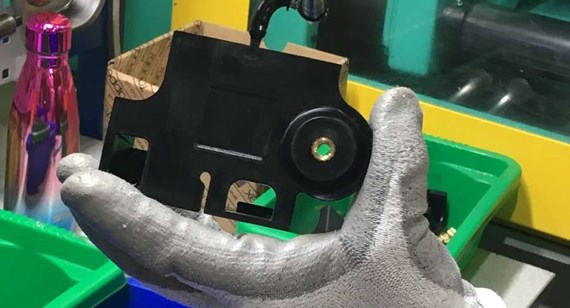Lives are being saved in the UK after Protolabs' express tooling service helped ramp up production of a vital breathing aid used in the fight against COVID-19.
"Unprecedented" is a term that has spread almost as fast as the pandemic itself in recent weeks when it comes to putting words to the current situation in the world.
Sometimes it is also used to describe the increase in capacity in health care across Europe, whether setting up temporary Covid 19 hospitals or procuring protective clothing for doctors and nurses.
The collaboration that has developed, not least in the world of manufacturing, can also be described as unprecedented. Formula One teams, aerospace suppliers, augmented reality experts, designer fashion brands and countless SMEs have all transformed their production to contribute.
Protolabs is one of the companies that has been involved in the fight against the pandemic from the beginning. The company's ability to ramp up production speed quickly has played a crucial role in the manufacture of the "Charlotte" and "Dave" valves, which convert diving masks into respirators, and in the rapid development of key medical testing equipment by AusDiagnostics.
The company, which employs 450 people at its European headquarters in Telford, England, has also joined the collaboration between Mercedes AMG High Performance Powertrains (HPP) and University College London to help them develop their CPAP device.
"CPAP" stands for Continuous Positive Airway Pressure or continuous positive pressure ventilation and helps coronavirus patients with pneumonia breathe easier. The CPAP system is the result of a round-the-clock collaborative effort that used reverse engineering to create a part that could be quickly manufactured in quantities of thousands.
Thanks to the engineering expertise of Mercedes AMG HPP and UCL, less than 100 hours elapsed from the initial meeting to the manufacture of the first unit for assessment and approval, which took place at the end of March.
The UK government ordered 10,000 CPAP units and mass production began. Protolabs was to produce two new moulds to make 10,000 brackets to mount the device next to the patient's bed.
At the same time, the Mercedes MG HPP purchasing team also wanted a third tool to produce a protective cap for the air inlet.
"Speed was of the essence for this project as we needed to deliver the CPAP system to the NHS health service as soon as possible," explained Baninder Kaur, Strategic Account Manager at Protolabs and lead member of the team working with Mercedes AMG HPP.
"Within hours of the request, we had mobilised a dedicated design and manufacturing team to analyse the bracket design for feasibility and provide advice on how to meet the tight deadlines."
She continued, "This led to four quick iterations, a verification of the material for both parts and the decision to manufacture the bracket with two moulds so we could reduce the manufacturing time by producing in parallel.
A few minor adjustments were also made to the cap. Our engineers considered the possibility of using a two-cavity mould to achieve the required output of 1,100 parts per day. Most importantly, this would also give the customer complete control in terms of accuracy, which is critical in the medical sector."
Protolabs assembled a 20-strong team to work with Mercedes AMG High Performance Powertrains to develop the injection moulds in just three days.
Parts were analysed using Protolabs' proprietary software, first for quoting and then to perform pricing and feasibility analysis. Automated turnaround time was calculated and further reduced after manual review in view of the urgency of the orders.
When the order was placed, the mould was also designed using software. Mouldflow was then used to determine the optional position for the sprues. In this way, the mould fit and separate components for the moulds were created.
This was followed by working out the mould paths for the various carbide cutting tools for the cavities. Then the control programmes were created and transmitted to the 3-axis CNC milling centres designated for production.
Accelerated production
The first sample parts made of nylon reinforced with 30% glass fibre and acetal copolymer were sent for testing. After successful results, production of 1,100 pieces of each component per day was agreed.
Protolabs began injection moulding on the evening of 9 April and, thanks to a time and motion study, the manufacturing team immediately found ways to optimise cycle time.
Staff agreed to support the production process over the Easter holidays as well, so that all breaks were covered and the entire volume could be completed within 72 production hours. The parts were picked up at five different times to support the ongoing production at Mercedes AMG HPP.
Once assembled, the CPAP machines and equipment were delivered to 250 hospitals across the UK to ensure COVID-19 patients continued to receive the best possible care.
Summing up, Bjoern Klaas, Vice President and Managing Director of Protolabs EMEA, said:
"Protolabs' employees continue to play a pivotal role in helping us meet the needs of our customers during this generationally defining time. I am extremely proud of the dedication and expertise demonstrated by all, and humbled that we can help save lives for doctors and caregivers in our own way."
Customer quote
"These life-saving devices are essential for the NHS to be able to ventilate patients without intubation and reduce the need for intensive care beds and staff.
It is a phenomenal achievement that they have been delivered to hospitals just two weeks after the first prototype was manufactured. It shows what is possible when universities, hospitals and industry work together for the good of the whole country."
Professor David Lomas, UCL Vice Provost Health.
www.protolabs.de
